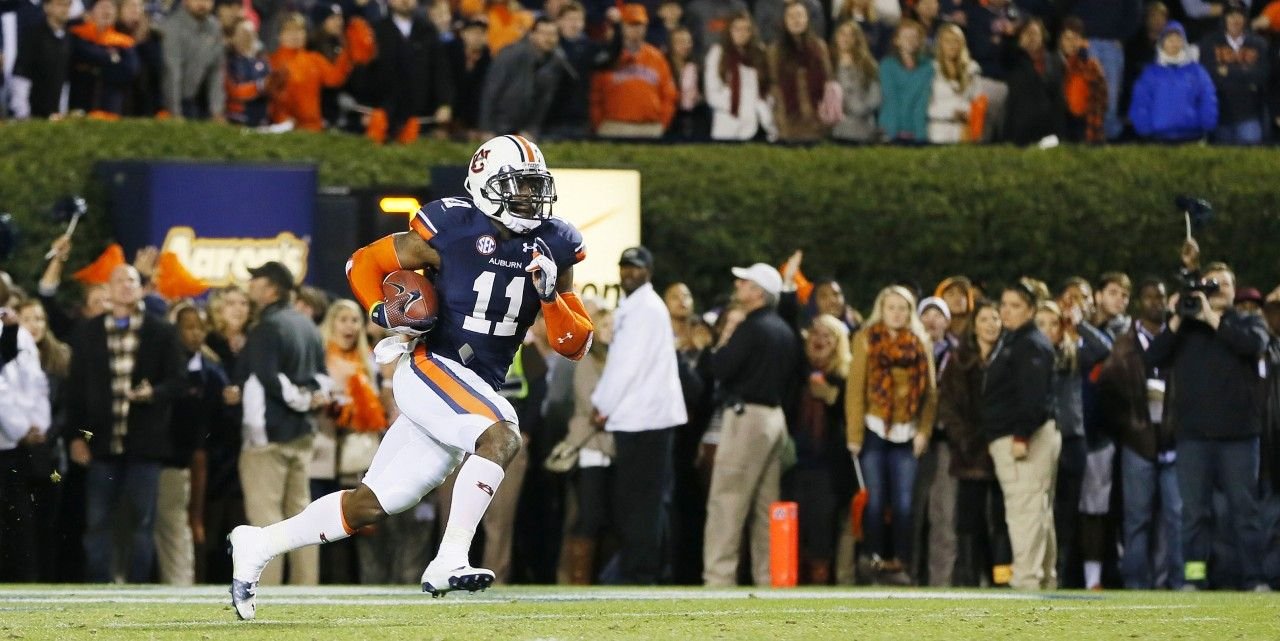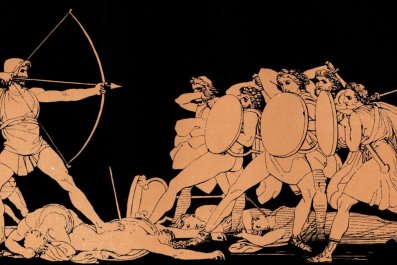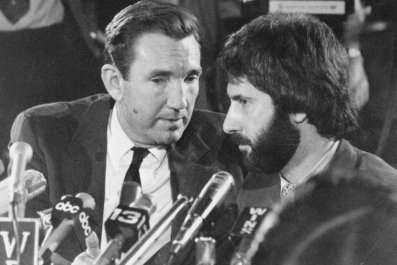When Ohio State takes the field Saturday evening for the Big Ten Championship Game in Indianapolis, the Buckeyes will gaze upon each end zone with relief. It will be the first time in a week that Urban Meyer's squad will not have had the goalposts moved back on them.
Welcome to the final installment of the Bowl Championship Series (BCS) where, even though there remain but two major undefeated college football programs heading into this final weekend, controversy has chosen to throw a challenge flag. Yes, it is a manufactured controversy, and, yes, the proponents of the college football "playoff" that will take effect beginning next season are happy to stoke it. Nevertheless, the one constant in college football - acrimonious disagreement - still sits atop the rankings.
Ohio State is one of two major college football teams still undefeated (the other is Florida State; Northern Illinois, while technically in the same category as those two, is compromised by a weaker schedule but, hey, one irate fan base at a time, please). As the two top-rated teams in the final BCS standings advance to the National Championship Game in January, the Buckeyes should be a shoo-in for Pasadena. But our Southern compatriots, i.e., the Southeastern Conference (SEC) are not quite ready to relent their seven-year stranglehold on the national title.
How did we get into this mess?
On the first day of November, the Buckeyes were one of five undefeated teams from an Automatic Qualifier conference, but found themselves ranked fourth in the BCS standings. All month long, even as fellow unbeatens Oregon and Baylor (which, until we hear conclusive evidence to the contrary, are the same program) fell, Ohio State and its legion of scarlet-and-gray-clad followers were told that a table at the BCS National Championship Game had not yet opened for them. Alabama and Florida State remained unvanquished as well, and the Crimson Tide and Seminoles were simply, by writ of Harris Poll voters (of which I am one) and computer analyses, superior.
Then, on the final day of November, last Saturday, a funny thing (okay, a miraculous thing) happened at Jordan-Hare Stadium. The Auburn Tigers, employing the old return-a-short-field-goal-attempt-109-yards-with-no-time-remaining-for-the-winning-touchdown ploy, shocked their top-ranked and two-time defending national champion rivals, the Crimson Tide, 34-28. From Montgomery to Muscle Shoals, the state of Alabama became a state of pandemonium.
For those who consider "War Eagle" a salutation, the moment was rapture. For fans of the Crimson Tide, a program at the doorstep of its fourth national title in five years, it was more than they could bear.
Still, for about 15 minutes, perhaps even 30, there was consensus: This was the most magnificent, memorable college football game we had ever witnessed. Sportswriters on the scene, some of whom have been working since before these two Southeastern Conference (SEC) programs were integrated in the 1960s, said as much. Consider, for example, that in the fourth quarter Alabama scored the go-ahead touchdown on a 99-yard pass play from Heisman Trophy candidate A.J. McCarron to Amari Cooper, and yet that would not even be the longest go-ahead touchdown play of the quarter.
It was that rarest of things in college football: a unifying moment. We were all basking in a game for the ages, college football's equivalent to the Miracle on Ice in 1980 or Christian Laettner's buzzer-beater against Kentucky in 1992. And we could all agree, as the curtain fell on November, that only two programs from major conferences had a zero following the hyphen in their records and hence should be the top two teams.
Peace in our time, we thought. That is, until Jay Jacobs, the athletic director at 11-1 Auburn, spoke. "An SEC team can't get left out of the (national championship game) with one loss," he told Dan Wolken of USA Today, trolling an entire nation (the Tigers are headed to Saturday's SEC Championship Game, where they will meet 11-1 Missouri). "It's already happened in 2004 and it would be a disservice to the nation if we got left out."
That was the sound-bite ESPN and any other media entity needed (or yearned for?) in order to fan the flames of BCS frustration for one more week. Suddenly, ESPN's experts and other college football notables were obliged to compare Ohio State, which is 12-0, and Auburn, which is 11-1. The debate has raged all week, even though the more apt comparison should be between the 11-1 Tigers (Auburn) and the 11-1 Tigers (Missouri). But, of course, they'll settle it on the field in Atlanta on Saturday.
Some sports have fans. College football has true believers. Pilgrims.
College football is tantamount to a religion ("Roll, Tide!" is, for hundreds of thousands, a blessing) and like any popular religion, it has its factions. The greatest division, one that has racked the sport for more than a decade, is between those who desire a playoff, who appear to sit in the majority, and those who, like myself, do not. What is indisputable, currently, is that the sport's denizens are the most passionate in American sport.
Campers and RVs began queuing up for last Saturday's Iron Bowl (Alabama vs. Auburn), the state's annual gridiron Armageddon, a full week before kickoff. In Ann Arbor, Mich., where then-No. 3 Ohio State had a date with its rival, unranked Michigan, 113,511 souls bore witness. Technically, it was not a playoff game, but this contest drew more fans than any NFL contest - or any Major League Baseball game, for that matter - had ever drawn. In fact, Michigan Stadium has hosted the six largest crowds in American sports history, including 115,109, the record, for the Wolverines' win against Notre Dame in September.
Last Saturday's contests made superlatives superfluous. The Buckeyes outlasted Michigan, 42-41, when the Wolverines scored a touchdown and then chose to attempt a two-point conversion, which failed, in the final seconds. A few hours later at Jordan-Hare, a game that exceeded every expectation - and this for the most highly anticipated installment in the history of this sport's fiercest rivalry - transpired.
Afterward, the prevailing wisdom on Twitter seemed to suggest among sports fans that (A) Nothing can top college football for excitement, and (B) When the four-team playoff is introduced next season, this will be even better.
Pardon me, but did you notice a contradiction there? Would the Venus de Milo be enhanced if we simply fitted her with a full set of limbs?
What some of us find wonderful - and others find maddening about college football is that the season is a Rubik's cube. Each game, each outcome, shifts the cube in myriad unexpected ways. When last Saturday began, the discussion was which of the three unbeaten would be deprived of a spot in the BCS title game. By day's end we saw that one school had been eliminated and another, the Buckeyes, had come one play away from joining them.
And if that had happened, teams that had woken up seemingly outside the national title narrative - one-loss teams such as Oklahoma State and Michigan State, would suddenly find their chances revived. Of course, the Cowboy players will forever kick themselves for having lost to an unranked West Virginia team in September, while the Spartans will do the same for having lost to a now unranked Notre Dame team that month.
"If we had only beaten the Mountaineers," Oklahoma State will say.
"If we had only beaten the Fighting Irish," the Spartans will add.
But you know what? They didn't.
That is exactly what makes college football, as presently constituted, so unique and magical. The journey, as opposed to the destination. The opportunity, the challenge, the pressure, to win every game fully cognizant that with each successive victory the following week's opponent will summon an effort that is increasingly and exponentially above its norm.
That is why an unranked Wolverine squad, which had rushed for a total of 130 yards in its previous four games, galloped for 152 against the undefeated Buckeyes. Not because the "O" in Ohio State stands for "overrated" but because Michigan was that inspired. And that is why an Auburn team that trailed by two touchdowns in the second quarter outscored the most indomitable team in the land 27-7 the rest of the game. It put an exclamation mark on its season by spoiling its rival's.
For years those pilgrims in support of a playoff have expressed a desire to see the two best teams meet for the championship. But how often does that even happen in other sports? When the New York Giants, who were 10-6 in 2007, defeat the New England Patriots, who were 16-0, in Super Bowl XLII? When the Michigan Wolverines, who finished fourth in their own conference, meet the Louisville Cardinals in the final game of the NCAA Basketball tournament, which happened last April?
College football and its system for determining a champion is not perfect. Then again, you could avoid getting sand in your trunks if you paved over a beach, but then it wouldn't be a beach anymore, would it?
The same fans who were shouting at the injustice of there being five unbeaten teams at the advent of November and how did college football expect to sort out this mess are now shouting at the outset of December that there are two undefeated teams and how does college football expect to sort out this mess?
Florida State, which faces Duke in the ACC Championship Game on Saturday, is 12-0 and unbeaten.
Ohio State, which meets Michigan State this weekend, is 12-0 and unbeaten.
If both schools win, they must advance to the final BCS Championship Game in Pasadena on January 8.
It would be a disservice to the nation if they do not.

























